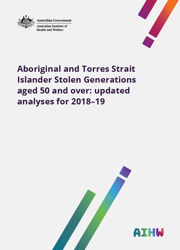Summary
In 2018–19 there were an estimated 27,200 surviving Aboriginal and Torres Strait Islander people aged 50 and over who had been removed from their families and communities as a result of past government policies. This represents around 1 in 5 (or 21%) of the total estimated Aboriginal and Torres Strait Islander population aged 50 and over in the scope of the 2018–19 National Aboriginal and Torres Strait Islander Health Survey.
These survivors among the Stolen Generations who are aged 50 or over are of special interest because of their greater needs for health, disability and housing services. This report presents detailed comparative analyses on a range of health and socioeconomic characteristics between the Stolen Generations aged 50 and over, other Aboriginal and Torres Strait Islander people who are also aged 50 and over but who were not removed from their families, and the general non-Indigenous population aged 50 and over.
The findings of this report show that the Stolen Generations aged 50 and over are more likely to be worse off than other Indigenous Australians of the same age on a range of health and socioeconomic outcomes. These results are consistent with a previous Australian Institute of Health and Welfare (AIHW 2018a) report which analysed a similar set of outcomes for the Stolen Generations aged 50 and over from an earlier 2014–15 survey.
Summary
1. Introduction
2. Demographic characteristics
3.How are the Stolen Generations aged 50 and over faring?
- Selected outcomes in 2018–19 for the Stolen Generations aged 50 and over
- Comparison between the Stolen Generations aged 50 and over and the
4. Indigenous reference group aged 50 and over who were not removed
5. Effects of having been removed from family
6. Comparisons with the non-Indigenous population aged 50 and over
7. Stolen Generations total population estimates and demographic profile
8. Descendants of all people who were removed
End matter: Acknowledgments; Abbreviations; References; List of tables; List of figures; Related publications



